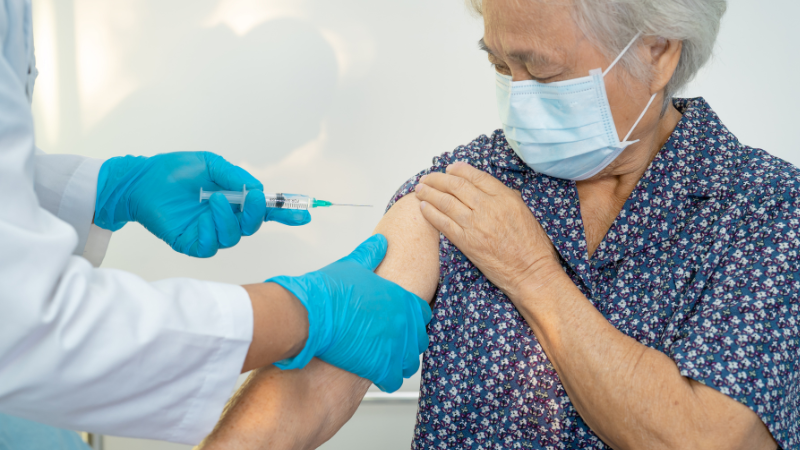

While the elderly are more likely to develop shingles, it is rarely a fatal condition. However, it can lead to serious health conditions that are known to have deadly outcomes, especially in seniors who live with a compromised immune system. Sometimes, reaching out to a home health care agency may be a good option for seniors to receive the assistance they need. Here’s what to know about shingles.
What is shingles?
Shingles are painful, blistery rashes that are caused by the varicella-zoster virus (VZV), which is also known as herpes zoster (HZ). Varicella-zoster is a common virus, one that is responsible for chicken pox. When the varicella-zoster virus reactivates in older adults, they develop shingles.
What reactivates the varicella-zoster virus?
The virus lives in the cells. As people grow older and their immune system weakens, such as through the common cold, stressful life events, or cancer treatments, the varicella-zoster virus can reactivate and lead to shingles. Immunocompromised individuals are at risk for developing this disabling condition.
Once the varicella-zoster virus reactivates, it multiplies within the older person’s body and migrates along the nerves. As the virus interferes with the nervous system, long-term neurological complications are likely to arise, such as postherpetic neuralgia and other ongoing health problems.
How common is shingles?
People aged 60 and over have the highest risk for developing shingles. Seniors live with immune systems that have naturally weakened due to age. As a result, their immune systems have a harder time fighting off infections, like shingles. Over one million cases of shingles are diagnosed annually.

What are symptoms of shingles?
Mild or severe pain is the first symptom of shingles, whether a rash has appeared. One or more of the following symptoms may develop: a rash of blisters filled with fluid, burning sensations and itching, numbness, and extreme sensitivity on one part of the body.
If blisters form on the eyes or near the face, eye damage, blindness, or short-term paralysis of the face can occur. Additional symptoms include feelings of general malaise, depression, upset stomach, and headaches. Fever, chills, and fatigue can also accompany a case of shingles.
What are complications of shingles?
Several health complications can manifest once a senior develops shingles. Older adults with the varicella-zoster virus have a higher risk for ischemic or hemorrhagic strokes. After an acute episode of shingles, their stroke risk grows notably higher; plus, the risk remains high after one year.
Studies also show a higher risk for heart issues in seniors with shingles. People who develop shingles experience a 30 percent increased risk of a heart attack or other cardiovascular event in the future. These are not the only serious, long-term health problems that stem from shingles.
Other health issues include bacterial skin infections, which can cause scarring. Hearing and vision loss may occur in older adults with shingles. Narcotizing fasciitis, encephalitis, transverse myelitis, and peripheral motor neuropathy can develop in the aftermath of a bout of shingles.
When seniors with shingles develop postherpetic neuralgia, the most common complication, they experience an enduring pain that fails to resolve even after the initial rash disappears. The pain associated with postherpetic neuralgia lasts for months, sometimes even years, in elderly patients.

Postherpetic neuralgia pain is felt in the location of the shingles rash. For many older adults, this long-lasting pain is the worst part of a shingles episode. Along with the physical pain, seniors are vulnerable to emotional distress, like depression, anxiety, and confusion.
The debilitating pain of shingles-related postherpetic neuralgia causes affected aging people to lose weight; the condition also disrupts their nighttime sleep. Older adults commonly experience trouble completing everyday activities, from personal hygiene tasks to dressing and socializing with others.
Does shingles cause death?
As mentioned, only in rare cases does shingles directly result in death. The Centers for Disease Control (CDC) reports that out of one million people, less than one person succumbs to shingles. However, shingles can lead to health complications that have fatal outcomes.
Shingles can be deadly when the senior suffers a compromised immune system and develops complications, such as inflammation in the lungs (pneumonia) or brain (encephalitis). Both pneumonia and encephalitis are fatal conditions. Life-threatening complications can arise even after the rash clears.
Can shingles be prevented?
Being vaccinated with a shingles vaccine may prevent an episode. Two doses of recombinant zoster vaccine (RZV, Shingrix) can prevent shingles and complications. Anyone who takes medication or suffers an illness that causes a weakened immune system should also be vaccinated.

How is shingles managed?
If a senior develops shingles, caregivers can help manage their symptoms at home. Relief may be found by applying a cool, damp cloth to the rash, engaging in light exercise (i.e. walking or stretching), eating nutritious meals, soaking in an oatmeal bath, and wearing loose-fitting clothing.
A shingles episode may last 3 to 5 weeks. The itching and pain may continue for a few more weeks. An antiviral medication is recommended, which can heal the rash and associated symptoms faster. Caregivers from Assisting Hands Home care are available to help affected seniors recover.
Home Care Assistance and Support from Assisting Hands

Our compassionate in-home care professionals at Assisting Hands Home Care take pride in supporting the elderly in their homes. If your aging loved one develops shingles, we’ll provide safe transportation to the doctor’s office for treatment. We give timely medication reminders to ensure they take their antiviral drugs correctly. Our caregivers will also provide assistance with hygiene tasks, like grooming, bathing, and toileting. We set out loose-fitting tops and bottoms so that the shingles rash remains covered, and the senior avoids scratching it. If desired, we’ll prepare an oatmeal bath to provide relief from shingles symptoms.
Senior home care services include grocery shopping and the preparation of heathy meals. Caregivers keep seniors hydrated throughout the day. We provide mobility support to give our care recipients greater confidence and stability as they take walks around or inside the home. Whether your aging loved one suffers from shingles, another health condition, or simply needs extra support, the licensed, bonded, and insured caregivers from Assisting Hands Home Care are ready to serve. Our caregivers provide services to seniors in Fort Worth, TX and the surrounding areas. Give us a call at (817) 646-2970 to schedule a free in-home consultation.
